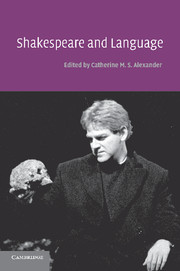Book contents
- Frontmatter
- Contents
- List of contributors
- Editor's note
- 1 Shakespeare and language: an introduction
- 2 Shakespeare's language and the language of Shakespeare's time
- 3 The foundations of Elizabethan language
- 4 Shakespeare's talking animals
- 5 Some functions of Shakespearian word-formation
- 6 Shakespeare and the tune of the time
- 7 Shakespeare's Romeo and Juliet: the places of invention
- 8 Shakespeare's thematic modes of speech: Richard II to Henry V
- 9 Hamlet and the power of words
- 10 The art of the comic duologue in three plays by Shakespeare
- 11 Hamlet's ear
- 12 ‘Voice potential’: language and symbolic capital in Othello
- 13 The aesthetics of mutilation in Titus Andronicus
- 14 ‘Time for such a word’: verbal echoing in Macbeth
- 15 Household words: Macbeth and the failure of spectacle
- 16 Late Shakespeare: style and the sexes
- Index
Editor's note
Published online by Cambridge University Press: 15 December 2009
- Frontmatter
- Contents
- List of contributors
- Editor's note
- 1 Shakespeare and language: an introduction
- 2 Shakespeare's language and the language of Shakespeare's time
- 3 The foundations of Elizabethan language
- 4 Shakespeare's talking animals
- 5 Some functions of Shakespearian word-formation
- 6 Shakespeare and the tune of the time
- 7 Shakespeare's Romeo and Juliet: the places of invention
- 8 Shakespeare's thematic modes of speech: Richard II to Henry V
- 9 Hamlet and the power of words
- 10 The art of the comic duologue in three plays by Shakespeare
- 11 Hamlet's ear
- 12 ‘Voice potential’: language and symbolic capital in Othello
- 13 The aesthetics of mutilation in Titus Andronicus
- 14 ‘Time for such a word’: verbal echoing in Macbeth
- 15 Household words: Macbeth and the failure of spectacle
- 16 Late Shakespeare: style and the sexes
- Index
Summary
The titles of these sixteen essays alone indicate the size and range of an area of study that elides ‘Shakespeare’ and ‘Language’, a subject that here includes style, speech, sound and sex. As the foremost Shakespeare publication, produced annually since 1948, Shakespeare Survey has been well placed to reflect trends and developments in academic approaches to Shakespeare and to language and this collection of essays, covering the period 1964 to 1997, considers the characteristics, excitement and unique qualities of Shakespeare's language, the relationship between language and event, and the social, theatrical and literary function of language.
The new introduction, by Jonathan Hope, explicates the differences between Shakespeare's language and our own, provides a theoretical and contextual framework for the pieces that follow, and makes transparent an aspect of Shakespeare's craft (and the critical response to it) that has frequently been opaque.
- Type
- Chapter
- Information
- Shakespeare and Language , pp. viiiPublisher: Cambridge University PressPrint publication year: 2004



